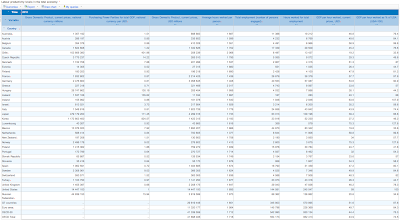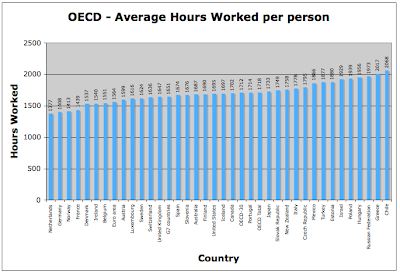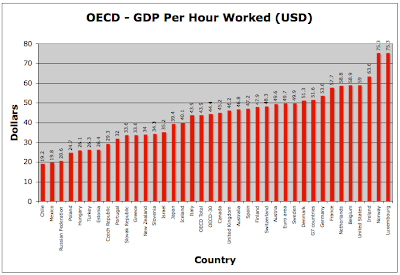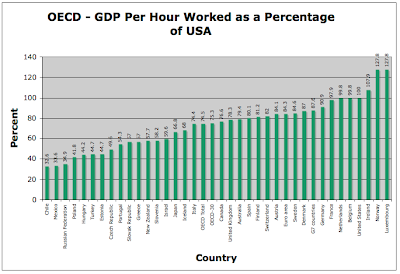While perusing the web, I stumbled on this interesting dataset for the nations that comprise the OECD. The Organization for Economic Co-operation and Development was established in 1961 to "promote policies that will improve the economic and social well-being of people around the world.". It is headquartered in Paris, France and has 34 member countries.
The OECD provides a database of economic statistics for general use. For this posting, I will be looking at the labour productivity dataset; while the labour productivity data is current only to the end of 2010, it gives us some sense of why certain nations are less prosperous than others and also tells us where our preconceived notions about labour "laziness" may be in error.
Here is the raw data in chart form from the OECD StatExtracts database:
So it is less daunting, I've created graphs from the data for three of the most pertinent measures for this particular posting; average hours worked per person, GDP per hour worked in United States dollars and GDP per hour worked, using the United States as a reference point (i.e. the U.S. output per hour is set at 100).
Here's the first graph showing the average number of hours worked annually by OECD nation from least to greatest:
The OECD average is 1718 hours, the Euro area average is 1564 hours and the G7 nations' average is 1651 hours. I was rather surprised to see Chile at the top of the list with 2068 hours worked, 20.8 percent above the OECD average. I was just as surprised to see Greece coming in 2nd place with 2017 hours worked, well above the United States at 1695 hours, Canada at 1702 hours and Germany, the pillar of Europe, coming in at a paltry 1408 hours, a level that is nearly 30 percent below that of Greece.
Now, let's take a look at productivity measured using GDP created per hour worked in United States dollars:
This data is a bit more telling. The OECD average is 43.9 dollars of GDP per hour worked, the Euro area average is 49.7 dollars of GDP per hour worked and the G7 average is 51.6 dollars of GDP per hour worked. Now we see that Greece, while working longer, creates less GDP on an hourly basis, coming in 11th last place out of 38 nations in the OECD database with an hourly average of only 33.6 dollars per hour worked, well less than half of the OECD average. In contrast, Germany comes in 7th place with its workers producing 53.6 dollars of GDP per hour worked, 22 percent above the OECD average. The most productive nations are Luxembourg and Norway; both nations are producing more than 75 dollars of output per hour worked. I also thought that it was interesting to note that Canada's output is well below that of the United States at only 45.2 dollars per hour worked, nearly 25 percent below the level of American labour which produced 59 dollars per hour worked.
Finally, let's look at a graph that shows the GDP output per hour worked compared to the United States:
The OECD average is 74.5 percent of the U.S. GDP per hour and the Euro area's average is 84.3 percent of the U.S. GDP per hour. Again, we see that there are only three nations that are more productive than the United States as we noted in the previous section.
It is an interesting exercise to look through the labour productivity data for the nations in the OECD. While I had expected that labour productivity in some nations, particularly the debtor nations of the PIIGS fraternity, would turn out to be far lower than their less indebted neighbours, such is not the case. This is particularly noticeable in the case of Ireland which has among the OECD's most productive labour forces, exceeding the output of all 38 nations in the database save three. Spain, even with its massive unemployment issues, also fares well with its labour output at 80.1 percent of the United States. Perhaps some of our pre-conceived notions about labour and productivity need a bit of readjusting, particularly in the case of Europe's debt transgressors.
Click HERE to read more of Glen Asher's columns
You can publish this article on your website as long as you provide a link back to this page.





Be the first to comment